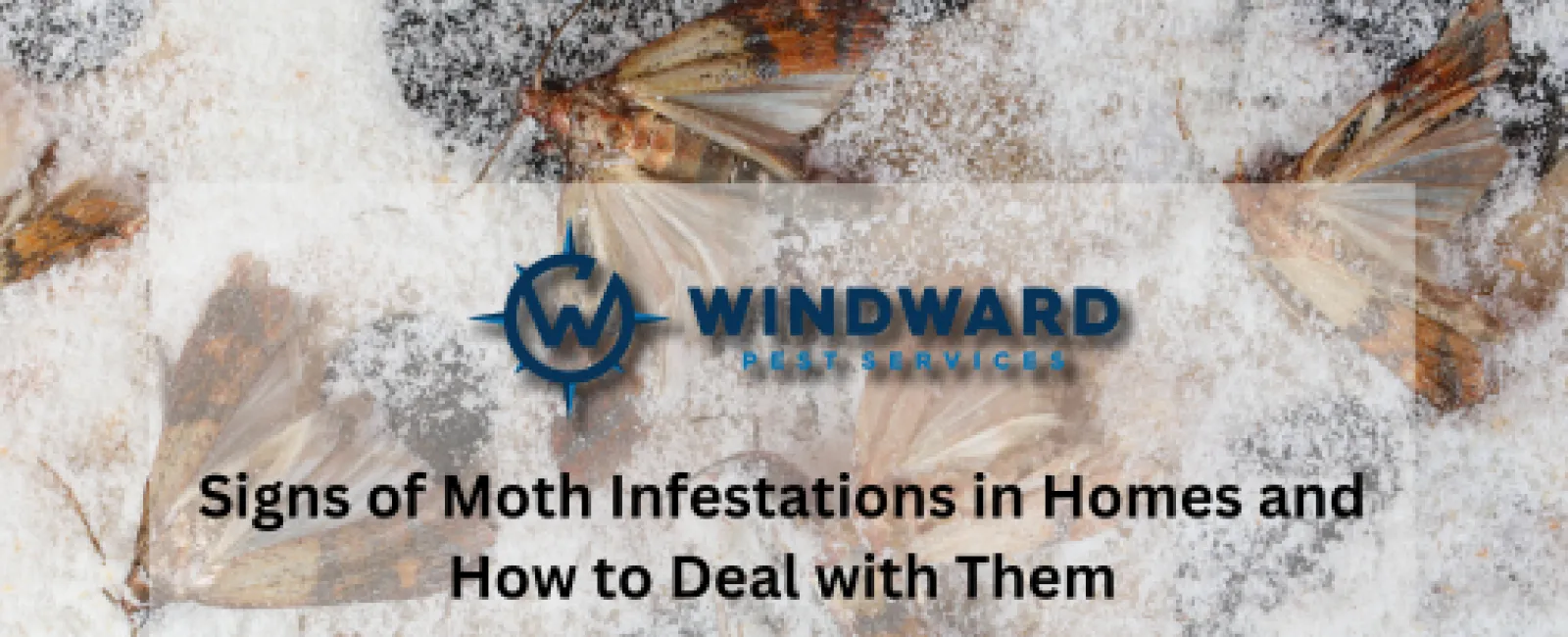Moths may seem like harmless insects, but when they invade your home, they can cause significant damage to fabrics, clothing, and food. Recognizing the signs of a moth infestation early is crucial in preventing extensive damage and controlling the problem effectively. With Atlanta pest control services from Windward Pest Services, homeowners in Georgia can stay vigilant against moths and other common household pests. Understanding the signs of a moth infestation and knowing how to deal with it is essential for maintaining a healthy, pest-free home.
Introduction: The Hidden Dangers of Moth Infestations
Moth infestations are often overlooked compared to more well-known pests like rodents or termites, but their impact can be just as destructive. Moths are often associated with ruined clothes or contaminated pantry items, but the issue runs deeper than just nuisance damage. In Georgia, where the climate can encourage the breeding of pests, Atlanta residential and commercial pest services are frequently called upon to address moth infestations that have spiraled out of control.
Not only can moth infestations lead to costly damages, but they can also become a recurring issue if not handled properly. Unlike other pests that are easily noticeable, moths often hide in dark corners, closets, and pantries, making it hard to detect them until significant damage has occurred. This is why professional Atlanta pest control is so important—without timely intervention, moths can quietly wreak havoc in your home.
In this article, we'll delve into the common signs of moth infestations in homes and how to effectively deal with them. By understanding these warning signs and taking swift action, you can protect your home and belongings from the destructive effects of moths.
Signs of Moth Infestations in Homes
Identifying a moth infestation early on is critical for minimizing damage. Moths are generally divided into two categories: fabric moths and pantry moths, each with its own unique set of warning signs.
Damaged Fabrics and Clothing One of the most obvious signs of a moth infestation is finding holes or damage in your clothing, upholstery, or other fabrics. Fabric moths, such as the common clothes moth (Tineola bisselliella), feed on natural fibers like wool, silk, and fur. If you notice irregular holes or thinning areas in your clothing, especially in garments that are made of natural fibers, this could be an indication of a moth infestation. Windward Pest Services pest inspections can help identify the specific type of moth causing the damage and provide targeted treatment.
Presence of Larvae Moth larvae are the culprits behind most of the damage to fabrics and food. They are tiny, white, or cream-colored caterpillars that feed on organic materials. If you find small caterpillar-like larvae in your closet, drawers, or pantry, it's a sign that moths have laid eggs and the larvae are actively feeding. These larvae are often found on infested fabrics or in food containers.
Cocoons Moths go through a life cycle that includes the pupal stage, during which they create cocoons. If you find small silk-like cocoons attached to clothing, walls, or inside cupboards, this is a clear indication of moth activity. These cocoons can be hidden in crevices or corners, making them difficult to spot unless you conduct a thorough inspection.
Small, Flying Moths Indoors Adult moths are often seen fluttering around lights or dark, quiet areas of the home, such as closets or attics. While adult moths do not cause direct damage, their presence is a strong indicator that an infestation has already taken root, as they are often laying eggs in hidden places. Seeing small moths flying around your home, especially near food storage areas or clothing storage, should prompt immediate action.
Infested Pantry Items Pantry moths, such as the Indian meal moth (Plodia interpunctella), are a common pest in Georgia homes. These moths target dry goods like grains, cereals, nuts, and dried fruits. If you notice webbing inside food packaging, small larvae in stored food, or unusual odors coming from your pantry, it could be a sign of a pantry moth infestation. Atlanta interior and exterior pest treatments from Windward Pest Services can help eliminate pantry moths and prevent future infestations.
Increased Pest Activity in Dark Areas Moths prefer dark, undisturbed areas to lay their eggs and feed. If you notice increased pest activity in places like attics, basements, or behind furniture, this could be a sign of a moth infestation. Conducting a thorough inspection of these areas can reveal hidden infestations before they cause significant damage.
How to Deal with Moth Infestations
Dealing with a moth infestation requires a combination of immediate action and preventive measures. Once you've identified the presence of moths, taking the following steps can help eliminate the infestation and prevent it from returning.
Clean and Declutter Start by cleaning and decluttering the affected areas. For fabric moths, thoroughly vacuum your closets, drawers, and any other areas where moths have been spotted. Be sure to empty the vacuum bag or canister outside to avoid reintroducing moths into your home. Wash all affected clothing and fabrics in hot water to kill any eggs or larvae. For pantry moths, dispose of infested food items and clean all shelves and storage containers with hot, soapy water.
Use Moth Traps Moth traps can be an effective way to capture adult moths and prevent them from reproducing. These traps use pheromones to attract moths, trapping them on sticky surfaces. Place the traps in areas where moth activity has been detected, such as closets, pantries, or attics. While traps can help reduce the adult moth population, they should be used in conjunction with other control methods for maximum effectiveness.
Professional Pest Control For severe or recurring infestations, professional Atlanta pest control services are essential. Windward Pest Services pest inspections can identify the type of moth infestation and implement targeted treatments to eliminate the pests at all stages of their life cycle. Professional treatments may include the use of insecticides, fumigation, or other methods to eradicate the infestation and prevent future occurrences.
Preventive Measures Preventing future moth infestations requires ongoing vigilance. Store clothing and fabrics in airtight containers, especially if they are made of natural fibers. Use cedar blocks or mothballs in closets and drawers to deter moths. In the pantry, store dry goods in sealed containers and regularly inspect your food storage for signs of infestation. Routine pest inspections from Windward Pest Services can also help identify potential pest problems before they escalate.
Protecting Your Home from Moth Infestations
Moth infestations can cause extensive damage to both your clothing and pantry items, making early detection and prompt action critical. By recognizing the signs of a moth infestation and implementing effective control measures, you can protect your home from these destructive pests. Atlanta residential and commercial pest services provided by Windward Pest Services offer the expertise and solutions needed to address moth infestations quickly and thoroughly.
Regular pest inspections and preventive treatments are essential for maintaining a pest-free home in Georgia. With the humid climate of the region, moth infestations can quickly take hold, making it all the more important to stay vigilant. From fabric moths that target your clothing to pantry moths that invade your food storage, understanding the warning signs and taking proactive steps can save you time, money, and frustration.
If you suspect a moth infestation in your home, don't wait until the damage is done.

